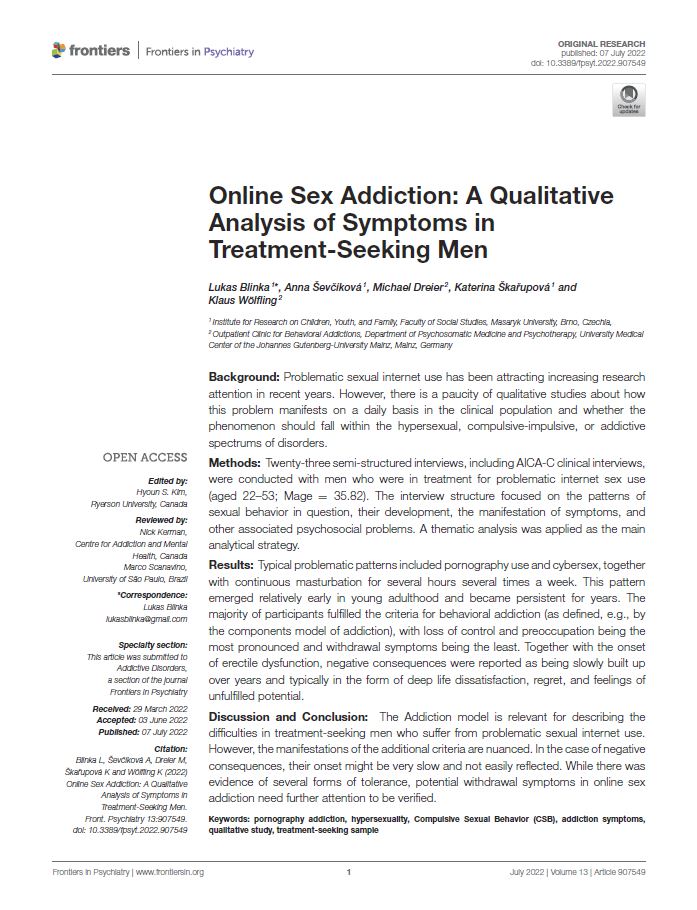Mental Health
Online Sex Addiction: A Qualitative Analysis of Symptoms in Treatment-Seeking Men
 Full Article Title: Online Sex Addiction: A Qualitative Analysis of Symptoms in Treatment-Seeking Men
Full Article Title: Online Sex Addiction: A Qualitative Analysis of Symptoms in Treatment-Seeking Men
Open Access: Yes
Abstract
Background: Problematic sexual internet use has been attracting increasing research attention in recent years. However, there is a paucity of qualitative studies about how this problem manifests on a daily basis in the clinical population and whether the phenomenon should fall within the hypersexual, compulsive-impulsive, or addictive spectrums of disorders.
Methods: Twenty-three semi-structured interviews, including AICA-C clinical interviews, were conducted with men who were in treatment for problematic internet sex use (aged 22–53; Mage = 35.82). The interview structure focused on the patterns of sexual behavior in question, their development, the manifestation of symptoms, and other associated psychosocial problems. A thematic analysis was applied as the main analytical strategy.
Results: Typical problematic patterns included pornography use and cybersex, together with continuous masturbation for several hours several times a week. This pattern emerged relatively early in young adulthood and became persistent for years. The majority of participants fulfilled the criteria for behavioral addiction (as defined, e.g., by the components model of addiction), with loss of control and preoccupation being the most pronounced and withdrawal symptoms being the least. Together with the onset of erectile dysfunction, negative consequences were reported as being slowly built up over years and typically in the form of deep life dissatisfaction, regret, and feelings of unfulfilled potential.
Discussion and Conclusion: The Addiction model is relevant for describing the difficulties in treatment-seeking men who suffer from problematic sexual internet use. However, the manifestations of the additional criteria are nuanced. In the case of negative consequences, their onset might be very slow and not easily reflected. While there was evidence of several forms of tolerance, potential withdrawal symptoms in online sex addiction need further attention to be verified.
Relevance
In this study of men in treatment for problematic online sex use, including pornography, the men reported “cognitive preoccupation” with pornography, use of online pornography to manage their moods, especially negative emotions, “loss of sense of time and self during sessions,” “relapse into the behavior after a period of relative control,” “self-disdain and self-degradation” as well as isolation from partners as a result of their use, increased tolerance leading to “growing intensity of the sexual material,” and “acute unpleasant symptoms” after withdrawal. In short, the study concludes that problematic use of online pornography is a “behavior addiction.”
Citation
Blinka, L., Ševčíková, A., Dreier, M., Škařupová, K., & Wölfling, K. (2022). Online Sex Addiction: A Qualitative Analysis of Symptoms in Treatment-Seeking Men. Frontiers in Psychiatry, 13, Article 907549. doi: 10.3389/fpsyt.2022.907549
